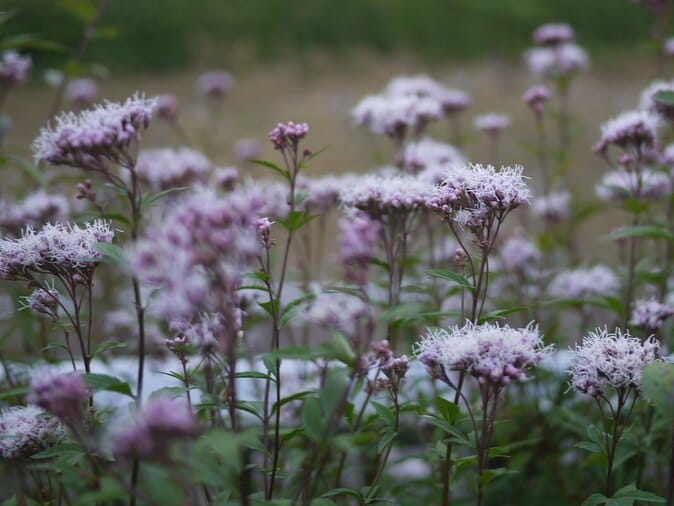Eupatorium, Pei Lan 佩兰
Thoroughwort, Orchid Grass, Fragrant GrassPei Lan (TCM)
 Eupatorium japonicum
Eupatorium japonicumPhoto by Sen Itto
Botanical name:
Eupatorium fortunei
Also E. japonicum, E. heterophyllum
Parts used:
Herb, fresh or dried
Temperature & Taste:
Neutral. Pungent
Classification:
J. Aromatics that Resolve Dampness
Uses:
1. Clears Damp, Benefits the Stomach:
-poor appetite, nausea, vomiting from Damp obstruction
-sickly sweet taste in the mouth with bad breath
-stifling sensation in the chest, chest oppression
-also for Damp-Heat affecting the Stomach and Spleen
2. Clears Summer-heat:
-summer heat and damp with fever, fatigue, chest oppression, nausea

Dose:
Decoction: 5–10 grams (10–20 grams of the fresh herb)
Powder: 1–3 grams
Substitute:
1. While Basil is listed as an adulterant in Bensky, it has similar functions and can be used as a substitute to awaken the spleen and clear Damp.
2. Agastache Huo Xiang
Main Combinations:
Often combined with Agastache Huo Xiang. Eupatorium Pei Lan is better for Damp obstructing the chest with chest oppression while Agastache is better for resolving Damp obstructing the Stomach and Spleen with Nausea and Vomiting. Together they more strongly resolve Damp.
1. Damp obstructing the Stomach and Spleen:
i. Eupatorium Pei Lan with Agastache Huo Xiang and Amomum Bai Dou Kou
ii. Eupatorium Pei Lan with Citrus peel Chen Pi, Amomum Sha Ren, Atractylodes Cang Zhu
2. Damp-Heat obstructing the Stomach and Spleen:
i. Eupatorium Pei Lan with Coptis Huang Lian
ii. Eupatorium Pei Lan with Agastache Huo Xiang and Scutellaria Huang Qin
iii. chronic, Eupatorium Pei Lan with Trichosanthes Radix Tian Hua Fen, Ophiopogon Tian Men Dong, Coptis Huang Lian
3. Summer Heat:
i. Eupatorium Pei Lan with Agastache Huo Xiang and Atractylodes Cang Zhu
ii. with Damp, Eupatorium Pei Lan with, Coix Yi Yi Ren, Scutellaria Huang Qin
Major Formulas:
Cautions:
1. Caution in Yin deficiency, Dryness or Qi deficiency.
2. Contains pyrrolizidine alkaloids. Avoid long-term use or large doses. It should not be used for more than 2–3 weeks without a break. Avoid in people with Liver disease.
